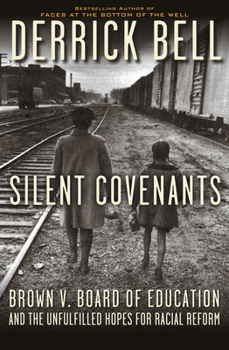Silent Covenants: Brown V. Board of Edcuation and the Unfulfilled Hopes for Racial Reform
Select Format
Select Condition 
Book Overview
When the landmark Supreme Court case of Brown vs. Board of Education was handed down in 1954, many civil rights advocates believed that the decision finding public school segregation unconstitutional could become the Holy Grail of racial justice. Fifty years later, despite its legal irrelevance and the racially separate and educationally ineffective state of public schooling for most black children, Brown is still viewed by many as the perfect precedent...
Format:Hardcover
Language:English
ISBN:0195172728
ISBN13:9780195172720
Release Date:April 2004
Publisher:Oxford University Press, USA
Length:230 Pages
Weight:1.22 lbs.
Dimensions:0.9" x 9.5" x 6.3"
Customer Reviews
3 ratings
Stimulating Read
Published by Thriftbooks.com User , 19 years ago
This is a book that I think anyone interested in the Civil Rights movement should read. It will make you think about the Brown v. Board decision in a different way. The book puts the decision into the context of the times, while shocking you with Bell's main argument. While I found Bell's argument interesting, and parts of it compelling, I could not bring myself to endorse it full heartedly. I still side with the likes of Thurgood Marshall on this one!
Thinking about Brown v. Board of Ed--not honoring it
Published by Thriftbooks.com User , 20 years ago
Read this book. It makes you think critically, challenge your assumptions, and argue with the author. What more can you ask of a book? Bell has the honesty to look at Brown from the perspective of its fiftieth anniversary, and ask the question, "What did it all mean?" Bell has the standing to ask this question, having devoted much of his life to litigation seeking to enforce the promise of Brown--often at not inconsiderable risk to his own life. Bell has the intelligence to bring to bear facts coupled with a historical perspective. His conclusion: Brown was a step in the right direction, but had far more effect as a symbol than as a legal decision. Factually, virtually no child (Black or White) received an education in an integrated classroom as a result of any court order enforcing Brown. What little integration occurred (and the number of children (Black and White) who attend effectively segregated schools today--50 years after Brown--is staggering) resulted from legislative action (the civil rights acts of 1964/65 and the school finding acts of the same period). Bell's analysis of Brown as a legal precedent is persuasive. It is more of a symbol than a living legal precedent. However, I disagree that Brown's symbolic power should be discounted. The reason that there have been so few cases citing Brown is that Brown so effectively ended legalized segregation. I would argue that without Brown, the civil rights movement of the late 50's and early 60's (sit ins, voter registration, and other direct action) would not have been possible. For example, James Meredith survived his attempt to integrate the University of Mississippi by using his personal defiance to leverage the power of the United States government to battle the Klan. Without Brown, Meredith's struggle simply would have died (perhaps most literally). Behind every successful mass movement was the protection (however ephemeral it may have been in all too many cases) of federal law enforcement. That presence would not have occurred without the mandate (and symbol) of Brown. As Atlas said, give me a lever and I can move the world. Brown did not move the world; did not eliminate racism, and did not end segregated schools. It did, however, provide a fulcrum. The mass movements and direct actions which followed were the lever. And the world did, indeed, move. Is racism gone? No. Are some people worse off than they were before Brown? Yes. Did Brown reach the issues of poverty generally or the impoverishment of Blacks in particular? No. Bot so what? No legal case or series of legal decisions can change a society. What they can do is point the way, and provide a base for struggle. And that is what Brown did. What more can you ask of a legal decision?
The best kind of contrarian/counterintuitive scholarship
Published by Thriftbooks.com User , 20 years ago
This is a brilliant book, one that challenges many of the feel good myths surrounding Brown. The notion of unfulfilled hopes is crucial in an age when people no longer acknowledge the signficance of race. I would buy this book along with a copy of Thomas Shapiro's The Hidden Cost of Being African-American.






